S P 8 D E THE GAME OF CHANCE CHANGED A DECENTRALIZED PLATFORM FOR GAMING DAPPS
INTRODUCTION
Welcome to Spade, a blockchain-based platform capable of supplying unbiased public randomness for developing and running distributed casino applications. Spade is designed to suit the purposes of all the actors comprising the online casino landscape and as such represents the new breed of digital institutions, a distributed intermediary. The spark that lit this project and continues to inspire us now, is that early blockchain and Bitcoin casinos simply didn’t get it right. The Blockchain community was younger and wilder, ideals of distributed freedom were burning brighter… still, early adopters who applied blockchain technology to gambling promoted the wrong ideals; those undermining the image of decentralized casinos. Instead of promoting transparency and cost efficiency that characterize blockchain technology, they promoted anonymity and cyber anarchy. Instead of making the casino for everyone, they kept it to themselves. By no means are we here to judge. Instead, we are here to change.
We do not say that old ways are bad, but can prove that new ones are better. We hold faith in the decentralized future and appreciate the charm of gambling. We soon realized that there is only a fragile wall of glass between the old centralized gambling and the future global distributed casino. This is it, a simple yet captivating idea. The future is here: we can run a zero-house edge decentralized casino with close-to-zero transaction fees and provably fair random numbers feeding entropy into a myriad of Smart-Contract-based open source casino applications that can be developed by anyone who has a worthy idea by means of state-of-the art application-specific as well general-purpose programming languages. “We can” was the silent voice of the idea. Now it is the marching echo of “we do”. As it frequently happens, technological progress made a massive leap forward that went unnoticed by the majority of human kind: people still prefer the traditional narrow-minded and boring online casinos that set draconian house edges and cannot be proven fair.
Once again, no one has the right to judge: it is just an existential business need, produced by a dilapidated business model and an inch of greed. Worse than this, however, is that even the enlightened ones, those chosen to witness the dawn of the distributed world have noticed a perfect fit between distributed consensus protocols and gambling applications, have synthesized them and… nothing. Some of these projects got infamous due to money laundering accusations, some have spoiled the beauty of the idea by running centralized online casinos and simply allowing for cryptocurrency deposits, others got their moments of fame during TGAs, today, however, few can recall even the names of these projects.
Of course, there are some notable exceptions to this rule, but while succeeding locally all these projects have failed to create awareness. None of them has broadcasted the essential message: “There is no glass wall; the future of gambling is now; we are better in every single quantifiable aspect; if quantifiable is not enough, we also have the powerful idea of the distributed future, while those who are stuck in the past have only a couple of servers and an unaudited poker protocol”. We will do what no one has done before. Spade is a blockchain-based platform for developing distributed gambling applications. As a platform for gambling applications with self-respect, we are equipped with the protocol for generating fresh unbiased public randomness. As a team with some aspirations we have it provably fair and completely decentralized. We feel that it is important to be true to the spirit of the venture we embark upon: if blockchain is the universal and undisputed source of truth then it should also be the broadcast channel for randomness. We think that single points of failure should be perceived by anyone as just a relic of the past. This feature, while setting us aside most starkly, is only a part of what we have to offer in terms of technological
In the European Union the online gambling industry grew nearly 19% from the first half of 2015 until the first half of 2016. The casino industry in particular generated over US$2 billion in revenues during this period. It is expected that until 2020 this number will reach US$2.25 billion per year representing about 12.5% revenue growth. In the US for the period 2015 until 2016 online casino revenues increased by 24.4% and are expected to reach US$4 billion by 2020. The EU and the US are just a small part of the worldwide casino industry. Globally, the projections of the online casino show that for the period 2017-2025 the market will experience growth of about 130% reaching US$97 billion with cumulative annual growth rate of nearly 11%. Currently over 6 million adults are officially participating in gambling activities around the world with projections of reaching 10 million by 2020.
Since inception, the blockchain technology was the subject of close attention by gambling enthusiasts. Recent news from The Merkle [4] show how popular online Bitcoin betting has become. In aggregate the wagers put on online Bitcoin casinos in February 2017 have reached nearly 3 Bitcoin per minute. The price of Bitcoin at the end of February was about US$1,200 while now it is US$5,900 (approximately 292% growth) which means that as of today almost US$715 million worth of Bitcoin was gambled in February alone.
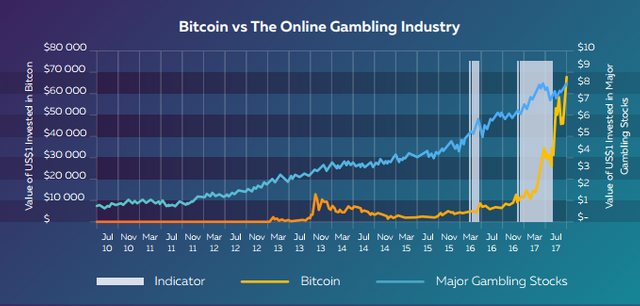
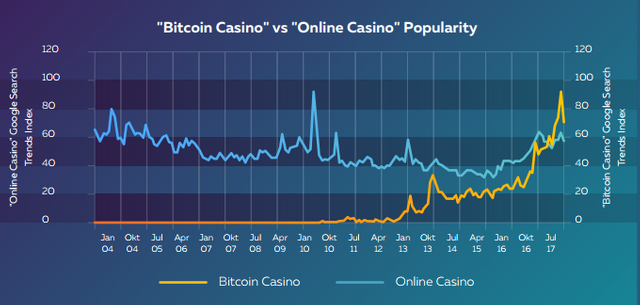
The Blockchain and the Casino
In what follows we describe a protocol for decentralized blockchain platform for developing casino applications with multiple unique features whose solid implementation is lacking in any of the currently existing projects in this space. The concept of decentralized consensus that lies at the heart of blockchain is based on the smart application of cryptography and game-theory. Combined, they create the economics of trust and hold immense potential for revolutionizing many classic industries.
This backbone of blockchain technology renders it an obvious candidate to consider in developing online gambling applications as, arguably, trust considerations and the need for transparency are - and always used to be - two major cornerstones of the gambling industry. In particular, blockchain has the potential to provide transparency to all transactions, drastically reduce the house edge, nearly eliminate transaction costs, ensure anonymity of participants and ultimately, create the trust among players and other industry participants. This rapidly evolving technological stack offers immense potential for improvements in the online gambling space, however, it also carries multiple new pitfalls that are scarcely (if at all) researched and poorly understood. To understand the benefits the blockchain brings, one needs to delve deep in the economics of casinos (the institutional viewpoint). Appreciating the challenges requires an overview of the mechanics of the blockchain technology.
So, why would applying blockchain to online gambling appeal to an average person?
Economics of Gambling
An Institutional Perspective While being driven throughout its long history by complex economic and sociological changes, the gambling industry has dramatically changed its competitive and institutional landscape – on the supply side it has changed remarkably little from the perspective of a person who wishes to try one’s luck. Indeed, it is still the same set of games that dominates the casino landscape, it is still the chance that defines one’s faith and these are still the classic transaction costs that interfere into the process, owing to the fact that the world we live in is not frictionless.
It follows that we can view the casinos from the perspective of institutional economics, a branch of economics studying the impact of institutions on the behavior of economic actors. One of the major roles the financial institutions play, in modern economics, is economizing on transaction costs, thereby facilitating financial transactions that would otherwise be unfeasible. They also serve as escrows, notorious trusted third parties, who facilitate trust among the participants allowing them to enter into an exchange more efficiently than would otherwise be the case.
In this vein, casinos act as “gambling” intermediaries realizing the economies of scale, maintaining order and quality of service, thereby facilitating the “conditional” transactions – bets. Let’s imagine the evolution of the gambling industry as a path towards reducing the transaction costs where innovative industry newcomers attempt to take a piece of the overall pie from the old incumbents by bringing gambling closer to the frictionless ideal.
In this vein, classic casinos reduce security and search costs, facilitate standardization by using chips and having house rules and, most importantly, realize economies of scale by bringing together people united by the shared desire to gamble. Following this line of reasoning, online casinos while performing the same functions as their classic brick-and-mortar counterparts, also facilitate convenience and economize on the travel costs on the side of players. The major reason for their existence, however, stems from their more lightweight cost structure that is characterized with virtually zero marginal cost of adding a new client.
This translates into significantly lower overhead costs, results in smaller house edge and, therefore, smaller average wagers and larger average net gains on the side of the clients. The advent of the cryptocurrency casinos came as a result of their anonymity feature as well as absence of any regulatory oversight. As many other applications of the blockchain technology in its early days, the major considerations behind setting up casinos on the blockchain were idealistic, impractical or outright shady in nature. The anonymity and laissez-faire regime, however, are not the features that fit best into our line of reasoning: indeed, the decentralized infrastructure does not imply any server maintenance costs: the protocol is autonomous; the bets are fair: the protocol code is public; its workings are imprinted into the immutable ledger forever and can always be verified by anyone. As a rule, once something new offers better ways for solving old problems, there always is a catch.
The Mechanics and Issues of On-Chain Casinos
Summarizing, the blockchain revolution allows for greatly enhanced transparency and efficiency of transactions, levels the playing field for online game development and greatly reduces overhead costs erasing the necessity of maintaining relationships with trusted third parties, bringing the concept of online casinos to a completely new level. While being clearly beneficial in some aspects, the net benefits of blockchain to the general public willing to put their hard-earned funds on stake are less clear-cut. The reason is that, unfortunately, while being secure and trustless, not a single blockchain protocol can compete in terms of efficiency with centralized systems, such as those that are used by the off-chain online casinos nowadays.
This imposes heavy burden on the user experience: one can imagine the winner’s frustration caused by the necessity to wait for 10 minutes before knowing if the roulette round actually settled on the blockchain. Even a 10-second delay can be detrimental to user experience once certain types of online gambling applications are concerned3. Ordering of transactions is of paramount importance in a distributed ledger (the root of the double-spend problem). Unfortunately, simple time stamping cannot be used to achieve distributed consensus on the ordering of transactions in a decentralized peer-to-peer network.
The blockchain protocols were created instead, offering a successful solution to the issue. However, decentralization always comes at a cost. Each block needs time to be mined and this creates inherent delays that are detrimental to user experience as far as casino applications are concerned4. Therefore, the first problem that needs to be resolved as efficiently as possible before online casinos can migrate on-chain is transaction settlement times. The second inherent problems lie around transaction fees. Indeed, all the praised benefits of the decentralized payment networks, such as instant settlement and virtually absent transaction fees turn their back on those daring to employ them for micro-transactions.
For example, currently the transaction fee to send ether on the native Ethereum blockchain is about US$0.351 and sometimes over US$1. Such fees are game stoppers in a literal sense when it comes to for example, 5-dollar bets. No one would accept 20% brute transaction fees for a US$5 online bet. This problem is further exacerbated by the fact that most of the popular blockchains currently in existence are based on Proof-of-Work consensus protocols that are infamous for not scaling too well. This implies that soon we can and will witness situations where a gambler would have to either pay even higher transaction fees or experience large delays in settlement (see problem 1).
It is also not clear, how to incorporate such choices on the level of the gaming application with more than one party involved. Furthermore, given that transaction fees on Ethereum or Bitcoin blockchains are paid in the underlying virtual currency, the cost of transaction is actually directly tied to the price of this currency. This translates into a proportional increase in transaction costs. Therefore, an ideal solution for an on-chain casino would necessitate a protocol that can scale seamlessly and that would have low transaction fees. This is, however, far from being the end of the wish list when it comes to blockchain casino applications. Here we have approached the cornerstone topic in on-chain casino design.
The immanent importance of this topic can only be matched by the extent of controversy associated with it. Before delving deep into complexities of probability theory, let’s summarize what has been said so far
- The uprising of the casino industry from the early days of humanity until the very end of the XX century can be portrayed in standard outlines of economic theory: it has been a long quest towards erasing the transaction costs by the means of centralization and institutionalization of the gambling process.
- The problems that have remained unresolved included poor transparency, high overheads incurred by casinos to maintain lucrative buildings and other required infrastructure that translated into high house edges; and, finally, the need to travel to a “physical” location.
- An additional problem was that of inclusion: indeed, not everyone could participate in the development of new games. Some of these problems have been partially resolved by the slow migration of casinos online. Nevertheless, those of poor transparency and large house edges have also remained. In general, these are the problems that are inherent to the legacy financial system; the one based on intermediation and trust.
- Therefore, it comes as no surprise that numerous projects have embraced the challenge to move the gambling process on-chain. This, however, turned out to be an ambitious aspiration with numerous pitfalls and seemingly unsurpassable technological barriers. While resolving the issue of inclusion, transparency (from the gambler’s perspective) and excessive house edges, blockchain gambling exacerbated those of high transaction fees and anonymity. It also brought new challenges along with it: how do we resolve the issue of slow settlement?
- Finally, we addressed the sinle most important problem: the generation of the distributed randomness.
Indeed, how does one generate provably random numbers on-chain? Overall, how one achieves provable randomness in applications where multiple parties are involved and the random number generated determines the distribution of the monetary gains and losses for those involved? An easy solution would be to use a local source of randomness, such as RAND() function in Microsoft Excel. However, there is a problem with this approach that renders it inefficient: local sources of randomness can be easily subverted and thus, there is no easy way for all the parties to verify that the number provided by a party is the number actually generated.
What about public sources of randomness? For example, Random.org, NSA or NIST all serve to provide “pure” randomness which is sampled from various natural sources, such as quantum physics processes. While indeed being public and random, these sources of random numbers suffer from all those problems we inherit from the ‘centralized’ yesterday: any application, however distributed, relying on them automatically raises the ‘single point of failure’ red flag.
Their outputs are susceptible to human errors, present an adversary with incentives to undermine their workings and finally, give malicious incentives to those running these protocols. As always, when one is stuck being unable to find a theoretically convincing and practically appealing answer in the domain of centralized applications, the world of distributed consensus is the place to search for answers. There is no easy way to get distributed randomness: blockchain protocols are deterministic by nature and, do not have implementations of random number generation on the protocol level. But it wouldn’t be blockchain if this was the final answer. The following ‘solutions” have been proposed and implemented :
Most of the attempts to circumvent this limitation in the end still rely on fresh entropy provided by either the users themselves or random oracles that in turn can either be manipulated or have malicious incentives of their own. So, random oracles – off-chain – single point of failure – red flag.
Others opted for a different path and proposed using the block hash. While such protocol design is much more appealing from a theoretical viewpoint as it generates random numbers on-chain (no red flag), it has another major flaw: given sufficiently large monetary incentive miners with sizeable hashing power can manipulate the game outcome by not submitting the freshly mined block. Using timestamps and virtually any other block content falls victim to the same issue.
Commitment schemes: the most promising solution with two major drawbacks: huge computational overhead and possibility that a malicious player will not open the secret after learning the outcome of the game. In other words, these schemes lack guaranteed output delivery. Monetary disincentives can be introduced to punish malicious actors basically collateralizing the Smart Contract thereby forcing the output delivery. In theory it works just fine. In practice one ends up with a slow and terribly expensive working protocol with limited applicability.
- Most of the attempts to circumvent this limitation in the end still rely on fresh entropy provided by either the users themselves or random oracles that in turn can either be manipulated or have malicious incentives of their own. So, random oracles – off-chain – single point of failure – red flag.
- Others opted for a different path and proposed using the block hash. While such protocol design is much more appealing from a theoretical viewpoint as it generates random numbers on-chain (no red flag), it has another major flaw: given sufficiently large monetary incentive miners with sizeable hashing power can manipulate the game outcome by not submitting the freshly mined block. Using timestamps and virtually any other block content falls victim to the same issue.
- Commitment schemes: the most promising solution with two major drawbacks: huge computational overhead and possibility that a malicious player will not open the secret after learning the outcome of the game. In other words, these schemes lack guaranteed output delivery. Monetary disincentives can be introduced to punish malicious actors basically collateralizing the Smart Contract thereby forcing the output delivery. In theory it works just fine. In practice one ends up with a slow and terribly expensive working protocol with limited applicability.
As we will show, something that is effective but inefficient can always be improved, but not the other way around. Points 1 and 2 unfortunately belong to the latter category, but the situation with the commitment schemes is different. The discussion so far has been quite abstract. A legitimate question is what does it all mean for the distributed gambling applications? Let’s review the recent projects in this sphere that have received their part of public attention.
Competitors’ Review
A number of other projects utilizing the blockchain are entering the gambling industry by either aiming to create a platform for online casinos or by simply placing a specific game or a variety thereof on-chain. As noted above, among the issues which are solved by simply creating blockchain-powered versions of the games, three main problems remain yet unaddressed:
- Transaction Settlement Time: it takes significantly longer to settle a transaction on-chain than off of it as each block requires time to be mined.
- Transaction Fees: the fee for each transaction can become prohibitively high and preclude small bet sizes.
- Provably random: the generation of randomness on-chain is a challenging as miners can see and modify block headers before everyone else.
More Information About SP8DE Please read Our WhitePaper
What is SP8DE?
Sp8de is a protocol for blockchain-based platform with multiple features that are essential for the growing blockchain gambling industry and whose solid implementation is lacking in any of the currently existing projects in this space.

Software license
Getting access to the universe of applications just requires you to own the native token of our system, SPX.
Gaming Chip
Betting within Sp8de ecosystem is done only using SPX. By owning SPX, you share a part in protocol’s success.
Royalties
SPX is used to reward the developers fairly on the protocol level.

The Search Engine of Gaming
Spade is a platform for developing decentralized casino applications.
Inspired to Create
Spade is decentralized marketplace for gaming with no frictions and no barriers to entry.
White Noise Powered Fairness
Voting mechanism is implemented on the protocol level: the rating of an application reflects the true consensus of the stakeholders and is immutable.
Legally Complient
Spade is intended to be fully compliant with all the required regulations.
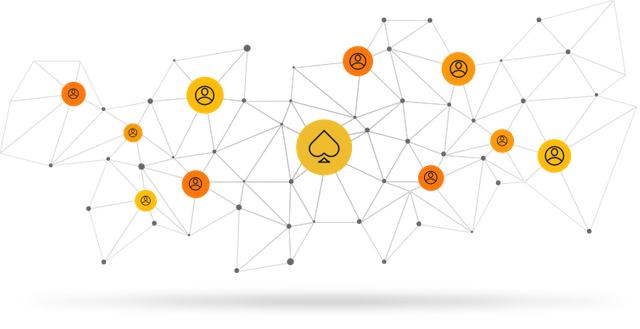
Decentralized 3.0
The backbone of Sp8de, the Cardano blockchain is the first Proof-Of-Stake protocol without security compromises.
Scalable and Efficient
Tens of thousands of transactions per second: no user experience constraints.
Sp8de Smart Contracts
Smart-Contracts scripting language that was specifically designed for this.
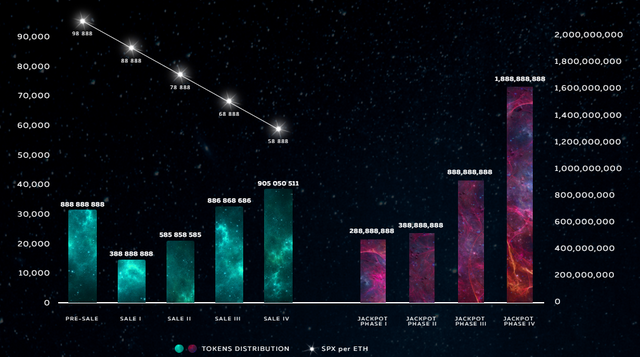
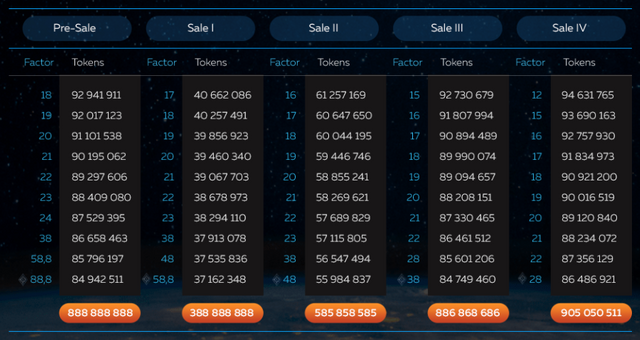
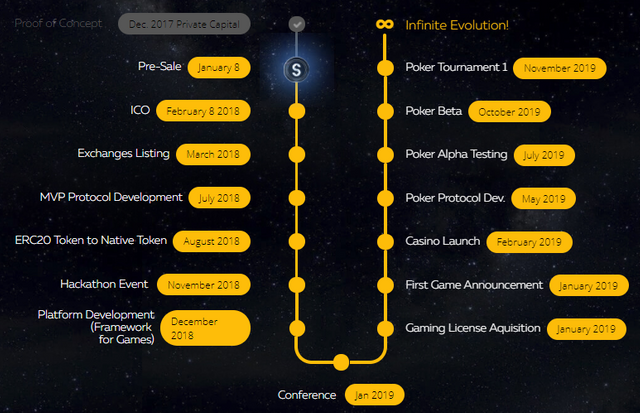
Tokens Distribution
There are 8,888,888,888 SPX tokens to ever be supplied. Initially, during the ICO, SPX will be issued on the Ethereum blockchain as ERC20 tokens. More detailed information can be found in the whitepaper and the SPX ICO description.
The token sale is organized in 9 phases: one pre-sale and four token sales that are each followed by a jackpot round.
As shown before the price of one SPX coin increases with every sale round. The number of tokens sold and jackpotted is larger every subsequent round for the exception of the pre-sale.
Every jackpot is played among all of the existing token holders.
Earlier participation allows for participation in more jackpot rounds. For example, taking part in the Pre-Sale and the first Sale gives access to all four jackpots. However, participation in, let’s say the third Sale will grant access only to Jackpots three and four.
Please, make sure to understand the mechanics of the Spade ICO process prior to taking part in it. Do not rely solely on the graph and be sure to understand the meaning of all the components of it and especially the highlighted segments of the jackpot bars.

Find and Join Our Community :
Website : https://sp8de.com/
Whitepaper : https://sp8de.com/sp8de_white_paper.pdf
Facebook : https://www.facebook.com/sp8deofficial/
Twitter : https://twitter.com/SP8DE_Official
ANN : https://bitcointalk.org/index.php?topic=2659341